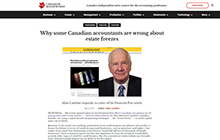Six strategies to minimize probate fees in your estate plan

These succession planning strategies can be cost-effective and save large amounts of tax that would otherwise be payable upon admitting the will to probate
The Probate Process
 |
David J Rotfleisch, CPA, JD is the founding tax lawyer of Taxpage.com and Rotfleisch & Samulovitch P.C., a Toronto-based boutique tax law corporate law firm. |
Probate is the legal process through which a deceased person's will is validated by the courts, and the administration of his or her estate is carried out according to the terms of the will. Probate fees or the Estate Administration Tax (EAT) are payable when a will is submitted to the court for probate and are generally based on the value of the estate dealt with under the terms of the will. It is calculated based on the fair market value of the deceased's estate, including all assets, property and investments on the date of death.
Probate tax is only payable when the estate goes through the probate process, meaning all assets that do not pass through a will subject to probate will not have probate fees levied on them. Through the probate process, an executor is appointed who will be responsible for paying all debts including taxes owing and then distributing the assets of the estate in accordance with the terms of the will. If there is an intestacy, the intestacy laws of the province will govern the treatment of assets.
Ways to Bypass Probate Fees (Estate Administration Tax)
1. Create multiple wills.
Certain assets will require probate if they are not jointly owned or designated to a beneficiary. These assets include real estate, bank accounts, investment accounts, vehicles, art, jewelry, and some business and property interests.
Other assets generally do not require probate, such as personal effects, shares of private companies (however, probate is recommended to ensure there are no potential challenges to share title by a future purchaser), and jointly owned property or property designated to a beneficiary.
Through the multiple wills tax planning strategy, two wills are created, with one will being the primary will and the other the secondary will. The primary will deals with assets it requires to pass through probate, and the secondary will deals with assets that do not require probate. On death, only the primary will is subject to probate and the probate fees or Estate Administration Tax associated with it, meaning it lowers the overall value of the estate that is subject to probate, so the overall probate fees payable are lower.
2. Distribute gift assets during your lifetime.
When an asset is gifted during your lifetime, it no longer forms part of your estate, and these assets are, therefore, not subject to taxes. Depending on the type of asset, however, transferring ownership may trigger a taxable disposition, which would result in taxes payable at that time.
3. Own assets jointly, with a right of survivorship
Assets owned jointly with another person, such as a spouse, will generally pass directly to the surviving joint owner, provided there is right of survivorship. For example, if a house is owned jointly by spouses, the surviving spouse will automatically inherit the house without the need for probate. This can drastically lower the value of assets that need to pass through probate, and thus lower probate taxes. However, there are risks associated with this strategy. Risks include income tax potentially being payable as a result of the transfer, possible claims by creditors of the new joint owner(s), and a potential loss of the principal residence exemption, to name a few.
4. Designate beneficiaries for specific assets
Assets owned jointly with a right of survivorship may pass to the surviving joint owner(s) upon the death of a joint owner. The assets will generally not form part of the deceased joint owner's estate and will, therefore, not be subject to probate tax. Some financial institutions allow you to set up a transfer on death or payable on death designation for accounts such as RRSPs, RRIFs, and TFSAs. These accounts pass directly to the named beneficiary, avoiding probate. Additionally, life insurance policies may be designated in the name of a beneficiary, avoiding probate.
5. Inter-vivos trusts are exempt from probate fees
Transferring assets into a trust removes them from forming part of your estate upon your death, meaning they won't be subject to probate fees, provided your estate is not named as a beneficiary of the trust upon your death.
Normally, assets transferred to a trust trigger an immediate taxable event, but if you are over 65, you can use joint partner trusts or alter ego trusts to transfer assets to a trust and bypass probate without triggering an immediate table event. If you own a business, an employee ownership trust can also be an attractive option that provides unique tax advantages.
6. There is no estate tax (or gift tax) in Canada
In Canada, there is no federal or provincial estate tax or gift tax, which means that individuals are not required to pay taxes on the value of their estate upon death or on gifts given during their lifetime (with some exceptions), unlike in some other countries notably such as the United States.
However, Canada does have a system of "deemed disposition" upon death. This means that, at the time of an individual's passing, the Canada Revenue Agency treats all of the deceased's assets as if they were sold at fair market value, triggering capital gains taxes on any increase in value since the time the asset was purchased.
These taxes are payable by the estate. This deemed disposition rule applies to most assets, such as real estate, investments, and business interests, with some exceptions (like certain assets transferred by way of survivorship). While this avoids an estate or gift tax, the deemed disposition on death can result in significant tax liabilities for the estate if there has been substantial appreciation in the value of the deceased's assets over their lifetime. An estate freeze is a common strategy for mitigating this tax liability.
These succession planning strategies can be extremely cost-effective and save the estate large amounts of tax that would otherwise be payable upon admitting the will to probate.
FAQ
How much are probate fees in Ontario and in other provinces?
Each province/territory has a different scheme for calculating probate tax. Amongst those with the lowest probate tax are Yukon, Manitoba, Northwest Territories, Nunavut, and Alberta. Those with the highest probate tax are British Columbia, Nova Scotia, and Ontario. The other provinces lie somewhere in between. The method of calculating probate tax varies by province, but the probate tax ranges from 0% to around 1.6% of the total value of the estate.
Ontario Estate Administration Tax [probate fees] can be quite a hefty price to pay, depending on the size of the estate. If you apply for an estate certificate on or after January 1, 2020:
- You do not need to pay Estate Administration Tax if the value of the estate is $50,000 or less. However, you must still file an Estate Information Return within 180 calendar days after the estate certificate has been issued.
- For estates valued over $50,000, the Estate Administration Tax will be calculated as $15 for every $1,000 (or part thereof) of the value of the estate.
This means that for an estate with a value of $2.5 million, the estate administration tax payable will be $36,750. The good news is that there are ways to minimize this tax.
What is the threshold for small estate probate in Ontario?
In Ontario, if the estate is valued at $150,000 or less, the estate may be eligible for a simplified probate process, removing part of the administrative burden during a difficult time. However, if real estate is involved, probate is still required. Problems can arise if the Small Estate Certificate was issued and additional assets are subsequently discovered that disqualify the estate from eligibility. Care needs to be taken to ensure this will not be the case.
David J Rotfleisch, CPA, JD is the founding tax lawyer of Taxpage.com and Rotfleisch & Samulovitch P.C., a Toronto-based boutique tax law corporate law firm and is a Certified Specialist in Taxation Law who has completed the CICA in-depth tax planning course. He appears regularly in print, radio and TV and blogs extensively.
With over 30 years of experience as both a lawyer and chartered professional accountant, he has helped start-up businesses, cryptocurrency traders, resident and non-resident business owners and corporations with their tax planning, with will and estate planning, voluntary disclosures and tax dispute resolution including tax audit representation and tax litigation. Visit www.Taxpage.com and email David at david@taxpage.com.
Read the original article in full on Taxpage. Author photo courtesy Rotfleisch & Samulovitch P.C. Title image: iStock ID:1266786276.









(0) Comments